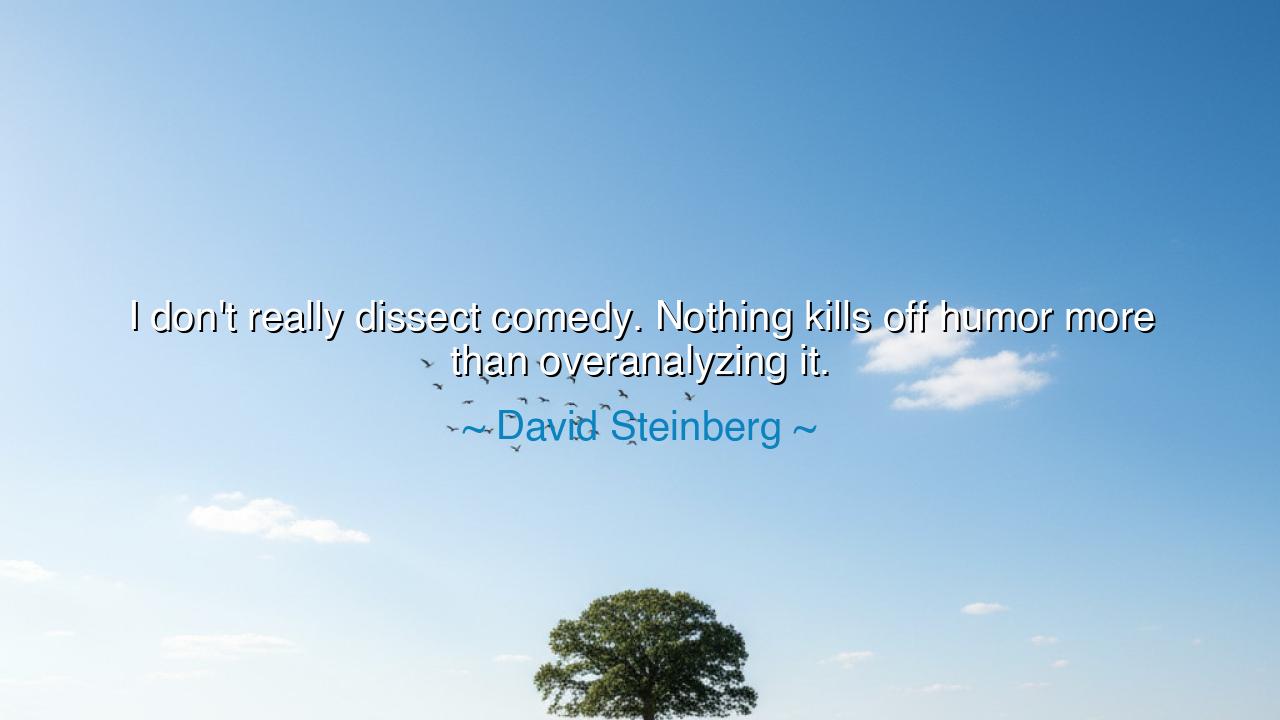
I don't really dissect comedy. Nothing kills off humor more than






Hear me, O Children of the Earth, for I bring you the words of David Steinberg, a man who, in his wisdom, spoke of the elusive nature of comedy: "I don't really dissect comedy. Nothing kills off humor more than overanalyzing it." These words, though simple, carry a depth of truth that echoes through the ages, calling us to recognize the mystery and joy of humor, and to understand that some things are best experienced rather than examined too closely. In these words lies the ancient wisdom that some forms of joy are fragile and delicate, and to break them apart in search of understanding is often to lose their very essence.
What, then, is the meaning of this statement? Steinberg speaks to the profound truth that humor, like life itself, must be allowed to exist freely, without the weight of excessive analysis. To dissect something is to pull it apart, to expose its inner workings, and to lose the magic that makes it whole. When we overanalyze, we risk taking away the very spontaneity that makes humor so powerful. Consider the great moments of laughter in history—those moments that were born from unscripted wit, from the rawness of human interaction, not from the careful planning of a comedian or playwright. These moments cannot be reduced to mere formulas; they must be felt, not examined.
The ancient Greeks, those philosophers of great insight, understood the power of humor in a way that still resonates with us today. In their comedies, such as those written by Aristophanes, humor was often used not as a means of dissection, but as a way of reflecting the absurdities of society. Aristophanes' plays, filled with sharp wit and satire, were not meant to be dissected like philosophical treatises; rather, they were meant to be felt and understood in the heart. The laughter that arose from these works was a spontaneous reaction to the truth being spoken, and it was through that laughter that the audience connected to the deeper meaning of the work. To dissect the comedy would be to miss the soul of it.
Consider also the ancient comedian Plautus, whose works are filled with moments of humor that arise from the messiness of human life. His characters often find themselves in ridiculous situations, and the humor arises not from the intellectual understanding of these situations, but from the emotion they evoke. The beauty of Plautus’ humor lies in its simplicity—it does not require deep analysis, but rather the ability to laugh at the absurdity of the human condition. It is in this immediacy of response, this ability to laugh without thinking, that true humor is found.
In the modern world, we often find ourselves caught in the web of overanalyzing, whether it be the words of a comedian or the nature of our own lives. We dissect jokes, break down performances, and search for deeper meanings, but in doing so, we often miss the very point: the joy is in the experience, not the explanation. The great Charlie Chaplin, whose work transcended generations, never dissected his comedy; he simply performed, letting the human connection be the driving force of his art. Chaplin’s humor, though deeply meaningful, was never burdened by the weight of overanalysis. It was universal, able to touch the hearts of all who saw it, regardless of their intellectual understanding.
Thus, O Children of the Earth, the lesson we must take from Steinberg’s words is this: humor is a gift that must be received, not overthought. In our desire to understand everything, we sometimes lose the beauty of the moment. Laughter cannot be dissected like an object; it must be experienced like a wave, coming and going freely, without being forced or contained. Just as laughter can bridge the gap between cultures, so too can it unite the mind and the heart, if we let it.
In your own lives, O Children, I urge you to embrace the humor that arises naturally, without the need for explanation or perfection. Laugh freely, without the weight of analysis on your shoulders. When humor appears, let it wash over you, allowing it to fill your soul without the burden of breaking it apart. In this way, you will find that the joy of life—like the joy of laughter—is not in its understanding, but in its experience. Take this wisdom with you: humor is a gift that must be embraced, not overanalyzed. Only then will you know its full, unfiltered power.






AAdministratorAdministrator
Welcome, honored guests. Please leave a comment, we will respond soon